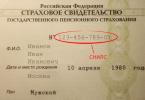Every year thousands of migrants from the CIS countries and other countries come to the territory of the Russian Federation. Everyone has their own purposes for visiting. Most are interested in making money and improving their quality of life. However, there are also those who came to visit relatives or to get an education. The concept of “deportation of foreign citizens” is familiar to all visiting foreigners. This unpleasant procedure happens most often to those who violate the law and order established by the Russian government. It is useful for every immigrant to know the intricacies of the procedure and what to do in order to never encounter this problem.
Historical data
The deportation of citizens or an entire people is a fairly common occurrence in world history. The deportation of people in different periods of time and in different states occurred much more often than it might seem at first glance. The meaning of the term deportation is the removal of a certain category of persons from their permanent place of residence. However, foreign nationals are expelled if there are legal grounds for this.
In particular, you can turn to the history of the USSR and find out that in those days the exile had a number of features. It was extrajudicial in nature and involved the movement of significant groups of people to remote parts of the country that were completely unsuitable for life. The modern Russian Federation, like the former USSR, still possesses such areas (northern uninhabited lands).
There is a scientific opinion that such peoples as Karachais, Koreans, Germans, Kalmyks, Chechens, Crimean Tatars, Ingush and others were subject to deportation during the Soviet Union. At the same time, some were deprived of national autonomy! In essence, the deportation of foreign citizens is a policy of global genocide that dates back to the first third of the 20th century.
Consequences of mass deportation to the USSR
Modern scientists believe that the mass resettlement of peoples in the Soviet Union caused irreparable damage to the country's economy and culture. The authorities were losing their authority, and a certain negativity appeared in the area of the national issue. That is why at the end of the 20th century the law “on rehabilitation” was passed, according to which all victims of genocide, forced relocation, and slander were considered repressed and were acquitted. Some of them returned to their former places of residence. 
Modern legislation
The deportation of a migrant is well known to all visiting foreigners. It involves the expulsion from the Russian Federation of anyone who violates the conditions of stay. Before going to Russia, it is useful to check your passport to see if the citizen is on the blacklist of the Russian Migration Service. It is equally important to know in advance who can be sent home and for what offenses. In certain cases, a person's deportation may be cancelled.
The procedure can only be applied to those residents of the country who are not full citizens. A citizen of the Russian Federation cannot be expelled from the country, even if he commits a serious crime (a similar situation with entering the country).
Deportation is not a punitive measure, but only one of the methods of administrative influence on immigrants. Some people confuse this concept with administrative expulsion or deprivation of citizenship. The process involves the temporary movement of foreigners (or stateless persons) outside Russia. This measure is resorted to only in cases where the guest of the country is one of the points of migration legislation. 
Rules for the stay of migrants
Foreign nationals who come to Russia should be aware of specific provisions of migration legislation:
- If a guest has the right to stay in a given territory for a limited time period, then after its expiration it is necessary to leave the country three days in advance.
- If the document giving the migrant the right to stay in Russia is cancelled, then the foreigner is given 15 days to leave the state.
The authorized service (FMS) monitors compliance with migration legislation. If they comply with the rules of stay in Russia, foreign nationals will not be forced to return home. 
Deportation: reasons for expulsion of foreigners
In order for a citizen of another state to be forcibly expelled from the Russian Federation, compelling reasons are needed. For example:
- illegal crossing of the Russian border;
- visa violation;
- The temporary residence permit, residence permit and other permits for temporary stay in the country have expired.
Illegal entry into the territory of a state is considered to be crossing the border using forged documents or entering through illegal means.
Categories of migrants who cannot be expelled from the country
There is a category of citizens who, in accordance with the law, are not subject to deportation. These are primarily refugees (if they have documentary evidence of their status), as well as those immigrants who have officially asked the Russian Federation for political asylum. In any of the above cases, registration is required with the migration service department at the place of stay.
Those foreign nationals who have just begun to apply for refugee status, but have not yet received it, also cannot be deported from the country. As long as the documents are being reviewed by the Federal Migration Service, foreigners are allowed to reside in Russia.
It happens that a foreigner loses the status of a political refugee, but in his native country his freedom or life is in danger. In this case, the government also cannot apply such a measure as deportation to the immigrant (this is dangerous for the person). Another exception to the rules are employees of international organizations (consulates, diplomatic missions). 
Is it possible to cancel the deportation and avoid “expulsion”?
The decision that a particular foreign national must be expelled from the country is made by a court. However, even before the trial, the immigrant must be warned that this measure will be applied to him, and he must voluntarily leave the Russian Federation as soon as possible. But even if the court decided to send the guest to his native land, there is an opportunity to correct the situation.
In order for a foreigner to remain in the country legally, he needs to file an application with the court to appeal the decision. The legislation of the Russian Federation provides a standard 10 days for appeal from the date of the verdict (until it has entered into legal force). If the period for appeal has already expired, they can make an exception and accept the application of a foreign national if he could not do this earlier for valid reasons. 
Legal grounds for canceling deportation
In order to legally challenge a court decision and avoid eviction from the country, foreign nationals are advised to enlist the help of a qualified lawyer in such cases.
Cancellation of the decision can be achieved if one of the following points is observed:
- A foreigner is married to a citizen of the Russian Federation and has a common child with Russian citizenship.
- At the time the court decision was made, the foreigner had a valid work permit, residence permit or temporary residence permit.
- An immigrant is studying at one of the universities in Russia.
- A foreign national came to the country to undergo a course of treatment.
But even if a foreign national has one of the listed reasons to stay, the process of overturning a court verdict will not be easy for him. It will be necessary to collect all the necessary documents and evidence, in addition, skillfully apply them in the trial. If a foreigner does not know Russian laws well, then it is better to contact a lawyer. 
Procedure for expulsion of foreigners
The final decision that a citizen of another state should be deported from Russia is made by the regional department of the migration department, which is located at the place of residence of the immigrant. It is this service that collects all the papers on the foreign guest and submits them to the court.
Following changes in legislation, measures against immigrants have become significantly stricter. Therefore, deportation in some cases means not only leaving the territory of the Russian Federation, but also a subsequent ban on entry into the country.
If a citizen of another country is expelled for the first time, he is deprived of the right to enter Russia for a period of 3 to 5 years. In the event of a second deportation, the measures may turn out to be much more cruel. For the third deportation, the immigrant will receive a ban on crossing the Russian border for a period of 10 years. In addition, for violations of the migration legislation of the Russian Federation, significant monetary fines are provided, as well as administrative deportation of the immigrant.




